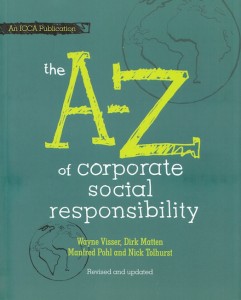Corporate Social Responsibility in Developing Countries
Chapter by Wayne Visser
Extract from The Oxford Handbook of Corporate Social Responsibility
The challenge for corporate social responsibility (CSR) in developing countries is framed by a vision that was distilled in 2000 into the Millennium Development Goals—‘a world with less poverty, hunger and disease, greater survival prospects for mothers and their infants, better educated children, equal opportunities for women, and a healthier environment’ (UN, 2006: 3). Unfortunately, these global aspirations remain far from being met in many developing countries today. The question addressed by this chapter, therefore, is: What is the role of business in tackling the critical issues of human development and environmental sustainability in developing countries?
To begin with, it is worth clarifying my use of the terms developing countries and CSR. There is an extensive historical and generally highly critical debate in the development literature about the classification of countries as developed and less developed or developing. Without reviving that debate here, suffice to say that I use developing countries because it is still a popular term used to collectively describe nations that have relatively lower per capita incomes and are relatively less industrialized.

This is consistent with the United Nations Developments Program’s (2006) categorization in its summary statistics on human development and is best represented by theWorld Bank’s classification of lower and middle income countries. It should be noted, however, that the UNDP’s classification of high, medium and low development countries produces a slightly different picture than the World Bank’s list of which countries are developed and developing.
CSR is an equally contested concept (Moon, 2002b). However, for the purposes of this chapter, I use CSR in developing countries to represent ‘the formal and informal ways in which business makes a contribution to improving the governance, social, ethical, labour and environmental conditions of the developing countries in which they operate, while remaining sensitive to prevailing religious, historical and cultural contexts’ (Visser et al., 2007).
The rationale for focusing on CSR in developing countries as distinct from CSR in the developed world is fourfold:
- developing countries represent the most rapidly expanding economies, and hence the most lucrative growth markets for business (IMF, 2006);
- developing countries are where the social and environmental crises are usually most acutely felt in the world (WRI, 2005; UNDP, 2006);
- developing countries are where globalization, economic growth, investment, and business activity are likely to have the most dramatic social and environmental impacts (both positive and negative) (World Bank, 2006); and
- developing countries present a distinctive set of CSR agenda challenges which are collectively quite different to those faced in the developed world.
The latter claim is explored further in the sections which follow and is summarized at the end of the chapter. The chapter begins by proposing different ways to categorize the literature on CSR in developing countries. It then reviews the research which has been conducted at a global and regional level, before considering the main CSR drivers in developing countries. Finally, a model of CSR in developing countries is proposed, before concluding with a summary and recommendations for future research …
Continue reading
[button size=”small” color=”blue” style=”download” new_window=”false” link=”http://www.waynevisser.com/wp-content/uploads/2012/04/chapter_wvisser_csr_dev_countries.pdf”]Pdf[/button] CSR in Developing Countries (chapter)
Related pages
[button size=”small” color=”blue” style=”info” new_window=”false” link=”http://www.waynevisser.com/books/corporate-citizenship-in-africa”]Page[/button] Corporate Citizenship in Africa (book)
[button size=”small” color=”blue” style=”info” new_window=”false” link=”http://www.waynevisser.com/books/the-world-guide-to-csr”]Page[/button] The World Guide to CSR (book)
Cite this chapter
Visser, W. (2008) Corporate Social Responsibility in Developing Countries, In A. Crane, A. McWilliams, D. Matten, J. Moon & D. Siegel (eds.), The Oxford Handbook of Corporate Social Responsibility, Oxford: Oxford University Press, 473-479.





